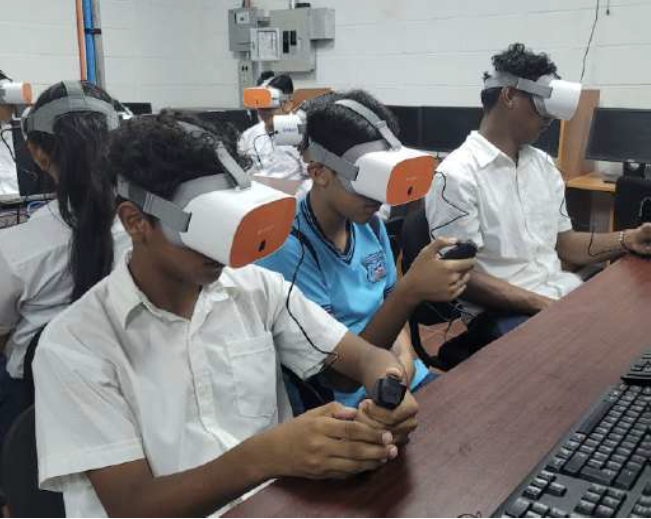Chicago (October 18, 2024) — A study conducted in 2023 examining the use of ClassVR virtual reality headsets in schools in El Salvador has provided further evidence that virtual reality (VR) makes a significant and positive impact on educational outcomes.
The study and research report “Virtual & Augmented Reality: Multisensory Tool for Academic
Excellence and Educational Continuity” is available at https://www.vrlatam.io/assets/pdf/paper1-en.pdf.
Conducted with low-income and rural public schools in El Salvador, this research confirmed that when used effectively, VR can increase student attendance, motivation, and knowledge retention. Key findings of the study include:
- Use of ClassVR increased knowledge retention by 6.7%. In more than 62% of classes, ClassVR resulted in a better average retention rate than the control group.
- Use of ClassVR led to a 23% increase in student motivation as compared with the control group.
- Students were 31% more likely to attend classes when ClassVR was used.
The study and research were conducted as part of the counterpart contribution provided by VR LATAM in a public-private partnership with the Salvadorian Business Foundation for Educational Development (FEPADE) under the USAID “Educar y Convivir Project,” implemented by FEPADE.
VR Latam, is the official ClassVR distributor for Latin America, and the project utilized VR teacher’s training endorsed by the Ministry of Education of El Salvador.
Over a two-month period, 297 ninth grade students (14-16 years-old) from 10 public schools participated in a controlled test study that examined the use of ClassVR in science and social studies lessons, compared with traditional teaching methods. Each school was equipped with a VR Lab which incorporated 16 ClassVR headsets with classroom management software and curriculum-aligned content for science and social studies. During the research period, 72 science and social studies lessons incorporated VR content and experiences.
Ahead of the research implementation, 120 hours of training was delivered to ensure the participating teachers were competent in using the VR technology and confident in pedagogical best practices. This formal teacher training program “Virtual Reality: Multisensory Tool for Academic Excellence” was endorsed by the Ministry of Education of El Salvador.
“It’s like another dimension for them … it’s really going to attract perhaps more students to schools and those students who have been left behind with the pandemic,” said BS. Aida Elizabeth Hernández Rivera, Principal – Educational Center Vuelta de Oro, about the impact of using virtual reality technology in schools.
El Salvador is undergoing a transformative process fueled by technology, with the government prioritizing digital inclusion, online education, and the digital economy. The Salvadoran youth actively contribute to this shift, aiming to establish the country as a prominent international technological hub. According to the presidential press secretary, El Salvador is determined to become a technological hub of international reference, aiming to attract foreign investment and promote economic development.
Rafael Javier Pérez Sánchez, training manager for VR Latam, noted that the results of the research in El Salvador can be highlighted as an example for other countries.
“The experience of incorporating virtual reality as a tool to enhance quality of instruction and student retention works as an example for all countries in the region. It is a complex challenge, but possible,” he said.
Following the excellent results of the pilot program, 32 more schools have been incorporated into this initiative. A new experimental study is currently being conducted, with results expected to be published by the end of the year. This new research will delve deeper into the impact of virtual reality on retention and includes additional dimensions such as attention, alongside motivation. Additionally, in 2024, a pilot program will begin in Honduras, applying the lessons learned from this first success story.
About Avantis
Avantis Education, the creators of ClassVR, provides simple classroom technology used by more than 2 million students in 200,000 classrooms in over 90 countries.
The world’s first virtual reality technology designed just for education provides everything a school needs to seamlessly implement VR technology in any classroom, all at an affordable price. To learn more visit www.avantiseducation.com and www.classvr.com.




